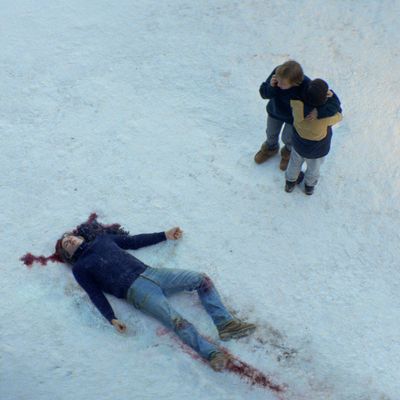
“What do you want to know?” These are the first words we hear, over a black screen, in Justine Triet’s Anatomy of a Fall. They are nominally part of an interview between author Sandra Voyter (Sandra Hüller) and a doting graduate student (Camille Rutherford), a conversation that goes immediately off the rails because Sandra’s unseen husband, Samuel (Samuel Theis), is upstairs repeatedly blasting the Bacao Rhythm & Steel Band’s steel-drum cover of 50 Cent’s “P.I.M.P.,” thereby making it impossible for anyone to hear themselves think, let alone talk. It’s a dryly funny scene, and one might be tempted to see some additional dark humor in the fact that Samuel is soon discovered dead, lying bleeding in the snow after apparently falling from the attic where he was working. The blood-splatter evidence suggests that he was hit with a heavy object before falling, and Sandra becomes the primary suspect.
Anatomy of a Fall is roughly structured like a courtroom thriller, with evidence collecting and interrogation that eventually lead to a lengthy trial; the title and some of the advertising even hark back to Otto Preminger’s 1959 classic, Anatomy of a Murder. But Triet lets us know early on that this won’t be an ordinary procedural. She stretches unlikely moments while brushing over the kinds of turns that in more conventional hands would become key passages, thus weaving the idea of uncertainty into the very fabric of her film. The nominal question hovering over the story is whether Sandra actually killed Samuel or whether a depressed Samuel threw himself out of the window. The underlying (and more important) question, however, is whether we can ever know or fully understand the truth.
There are many reasons for Samuel to have felt great guilt and shame. Some time ago, the couple’s 11-year-old son, Daniel (Milo Machado-Graner), was blinded while Samuel was supposed to be watching him. Samuel’s dreams of becoming a writer fell by the wayside, even as Sandra’s career took off thanks to a series of semi-autobiographical works. (One of her books, we learn, is an expansion of an idea he once flirted with.) At the same time, Sandra admits to hiding certain facts from the prosecution, though her explanations are perfectly understandable and quite human: She worried that they would bias the court against her. Would a guilty person say such a thing? Well, would an innocent person?
Anatomy of a Fall won the Palme d’Or at this year’s Cannes Film Festival, and it’s already proven to be a huge hit in France. It will likely be a decent hit in the U.S. too. (It will probably help that much of the movie, including most of its key scenes, are in English.) It’s not hard to see why Triet’s picture resonates. It has both suspense and intellectual ambition; plot revelations don’t just send the story in new directions, they expand the film’s cultural scope.
The film’s central set piece involves a flashback to a fight Samuel and Sandra had the day before his death, in which they flung charges at one another — about their marriage, their child, their careers, their home. On one level, it’s the kind of blowup many couples sometimes have. In the light of Samuel’s death, of course, it could easily be interpreted as a prelude to something worse. Hüller’s performance walks a very fine line throughout the film. Her Sandra is both open and unreadable. She seems perfectly sensible and matter-of-fact, and yet there’s the gnawing sense that she’s keeping something from us.
More important, however, Samuel and Sandra’s accusations feel like facts colored by their respective resentments. Triet wrote the film with her own partner, the French filmmaker Arthur Harari; much as Sandra has done, they seem to have borrowed emotional elements from their own lives and placed them in a fictional context. Each individual presents a starkly different vision of their shared existence — yet it’s hard to say that either of them is wrong. Does the truth lie somewhere in between or does it encompass both of their realities? Or does it (gasp) simply not exist? Triet subtly taps into a particularly contemporary feeling that our perceptions of reality now take precedence over reality itself, an idea that has wormed its way not just into our politics (where the truth is always malleable) and interpersonal relations (where things are often fraught) but also the basic facts of human existence. If Wes Anderson’s Asteroid City explored the notion of humanity facing the unknowable, Anatomy of a Fall reveals our ability to turn the knowable into an ever-expanding, unanswerable question.
It would be unwise to get into the final scenes of Anatomy of a Fall — as noted, the film is admirably suspenseful — but Triet saves much of her rhetorical firepower until the end, when we get one final revelation that may or may not unlock the case. And yet, here again, even as the narrative is resolved, the director lets us bask in our doubt through an impressive use of emphasis and silence, with one last extended pause that prompts us to question the truth. It’s a lovely, terrifying grace note, giving us the satisfaction of a legal drama while sending us out into the night unsure of what exactly we’ve seen. The curse of wanting to know everything, it turns out, is the eventual realization that we know nothing.
More Movie Reviews
- Napoleon Charges in Without a Plan
- Hirokazu Kore-eda’s Heartbreaking Monster Hovers Between This World and the Next
- Maestro Is a Masterful Reconstruction That Remains Just That





